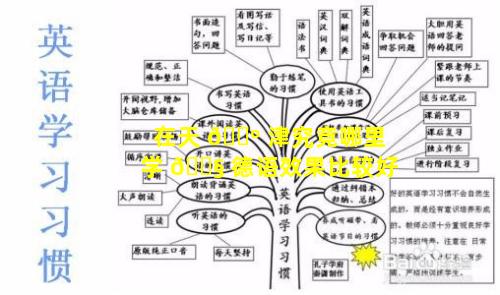如何巧妙高效地记忆德语单词呢
- 作者: 朱学屹
- 来源: 投稿
- 2024-10-01
1、如何巧妙高效地记忆德语单词呢
巧妙高效地记忆德语单词的方法
1. 利用联想和视觉化
将新单词与已知的物品、概念或图像联系起来。
创建图像、思维导图或故事来帮助你记住单词和含义。
2. 使用间隔重复
根据单词的难度和记忆力规律性,定期复习新单词。
使用间隔重复软件或应用程序,例如 Anki 或 Memrise。
3. 积极提取不要只是被动地阅读单词清单。尝试从记忆中提取单词,并在句子或对话中使用它们。
使用抽认卡或在线练习测试。
4. 沉浸让自己沉浸在德语中。阅读书籍、观看电影、听音乐或与说德语的人交谈。
环境中的暴露有助于巩固记忆。
5. 词根和词缀了解德语词根和词缀。这可以帮助你理解单词的含义并推导出相关单词。
例如,“heit”表示“特性”,因此“Schönheit”表示“美丽”。
6. 类别和主题将单词组织成类别或主题,例如食物、动物、职业。
关联相关的单词有助于提高记忆力。
7. 趣味记忆尝试使用游戏、歌曲或其他趣味方法来记忆单词。
例如,为每个单词编一个小段子或为它们写一首歌。
8. 利用技术使用语言学习应用程序、在线词汇表和翻译工具。
这些工具可以提供即时反馈并跟踪你的进度。
9. 与他人合作与朋友、同学或语言伙伴一起学习。
教他人新单词或一起做练习可以加强记忆。
10. 保持一致定期学习是关键。每天花 1530 分钟学习新单词。
短而频繁的学习时间比长时间的偶尔学习更有效。
2、如何巧妙高效地记忆德语单词呢英文
How to Memorize German Words Smartly and Effectively

3、如何巧妙高效地记忆德语单词呢英语
How to Effectively Memorize German Vocabulary
1. Spaced Repetition: Use flashcards or apps that use spaced repetition, a technique that helps you review information at increasing intervals, strengthening your memory over time.
2. Contextualize: Learn words in the context of sentences or stories. This helps you understand how the words are used and makes them more memorable.
3. Immersion: Surround yourself with German by listening to music, watching movies, or reading books. This helps you associate the words with their realworld usage.
4. Flashcards: Create your own flashcards with the German word on one side and the English translation on the other. Test yourself regularly to reinforce your memory.
5. Word Walls: Put up postit notes with German words around your home or workspace. Seeing the words often will keep them fresh in your mind.
6. Chunking: Break down large lists of words into smaller groups. This makes them easier to manage and memorize.
7. Mnemonics: Use memory tricks like rhymes, acronyms, or stories to help you remember words. For instance, you can remember "der Tisch" (the table) by imagining a table with lots of dishes (TischDishes).
8. Active Recall: Instead of simply reading the words, try to recall them from memory. This forces your brain to work harder and improves retention.
9. Word Games: Play word games like crosswords or Scrabble to practice and reinforce your vocabulary.
10. Consistency: Make memorizing German vocabulary a regular part of your routine, even for just a few minutes each day. Consistency is key to longterm retention.
4、怎样记德语单词词性最有效
记住德语单词词性最有效的技巧:
1. 使用权威词典:
始终参考可靠的德语词典,例如 Duden 或 Pons。
词典中会列出单词的词性、例句和用法。
2. 识别规律:德语中有一些词性可以根据单词的词尾识别。例如:
名词通常以 ung、keit、heit、tion、ment 结尾。
动词通常以 en、eln、ern 结尾。
形容词通常以 er、ste、lich 结尾。
3. 练习阅读:通过阅读德语文本,你会逐渐熟悉单词在不同词性下的用法。
注意文章中的词序和句子结构,这有助于你理解单词的词性。
4. 使用记忆技巧:
联想法:将单词与其词性联系起来,例如,将动词与动作联系起来,将形容词与特性联系起来。
间隔重复:定期复习单词和它们的词性,以提高记忆力。
使用卡片或应用程序:创建单词卡片或使用语言学习应用程序来练习单词的词性。
5. 参加课程或加入学习小组:
与其他学习者一起参加课程或加入学习小组可以帮助你交流你的理解并获得反馈。
教师或有经验的学习者可以提供指导和建议。
6. 保持耐心和一致性:
记单词词性需要时间和一致性。
每天抽出一些时间学习单词,并经常复习。
额外的技巧:使用在线词频词典,例如 Linguee,了解单词在不同文本中的使用频率。
分析德语歌曲歌词,以熟悉单词如何在词性上变化。
观看德语电影或电视节目,并专注于单词的实际用法。




